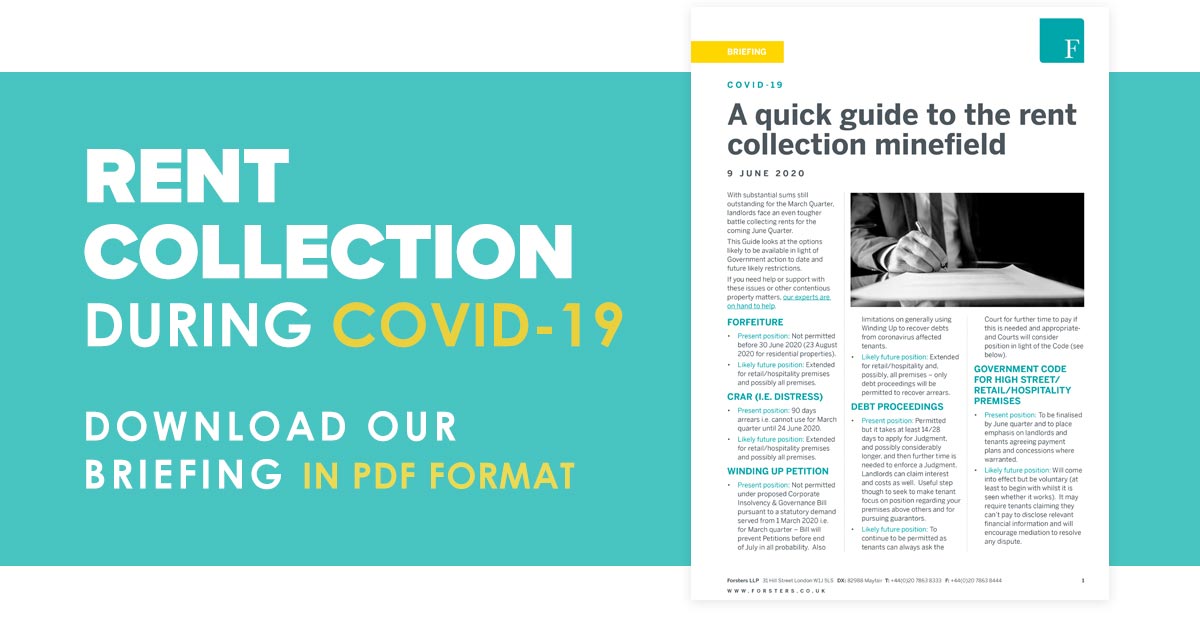A quick guide to the rent collection minefield
With substantial sums still outstanding for the March Quarter, landlords face an even tougher battle collecting rents for the coming June Quarter. This Guide looks at the options likely to be available in light of Government action to date and future likely restrictions. If you need help or support with these issues or other contentious property matters, our experts are on hand to help.
Our Guide looks at the options likely to be available in light of Government action to date and future likely restrictions:
Forfeiture
- Present position: Not permitted before 30 June 2020 (23 August 2020 for residential properties).
- Likely future position: Extended for retail/hospitality premises and possibly all premises.
CRAR (i.e. Distress)
- Present position: 90 days arrears i.e. cannot use for March quarter until 24 June 2020.
- Likely future position: Extended for retail/hospitality premises and possibly all premises.
Winding up petition
- Present position: Not permitted under proposed Corporate Insolvency & Governance Bill pursuant to a statutory demand served from 1 March 2020 i.e. for March quarter – Bill will prevent Petitions before end of July in all probability. Also limitations on generally using Winding Up to recover debts from coronavirus affected tenants.
- Likely future position: Extended for retail/hospitality and, possibly, all premises – only debt proceedings will be permitted to recover arrears.
Debt proceedings
- Present position: Permitted but it takes at least 14/28 days to apply for Judgment, and possibly considerably longer, and then further time is needed to enforce a Judgment. Landlords can claim interest and costs as well. Useful step though to seek to make tenant focus on position regarding your premises above others and for pursuing guarantors.
- Likely future position: To continue to be permitted as tenants can always ask the Court for further time to pay if this is needed and appropriateand Courts will consider position in light of the Code (see below).
Government code for High Street/Retail/Hospitality premises
- Present position: To be finalised by June quarter and to place emphasis on landlords and tenants agreeing payment plans and concessions where warranted.
- Likely future position: Will come into effect but be voluntary (at least to begin with whilst it is seen whether it works). It may require tenants claiming they can’t pay to disclose relevant financial information and will encourage mediation to resolve any dispute.
Statutory moratoriums
- Likely position: To be introduced by proposed Bill and will allow tenants some breathing space from any enforcement action (initially 20 working days but can be extended) to save themselves as a going concern with the help of a Licensed Insolvency Practitioner).
- Likely future position: Will be used by tenants who cannot reach agreement for credit with landlords and/or suppliers. Unfortunately, many companies will not survive as going concerns and will enter Administration or CVAs.
Government loans scheme
- Present position: The Bounce Back Loan Scheme, Coronavirus Business Interruption Loan Scheme, Coronavirus Large Business Interruption Loan Scheme, and the Covid Corporate Finance Facility provide tenants, and some landlords, with substantial financing to pay rents and other liabilities.
- Likely future position: Landlords will press tenants to use the loans they have obtained to pay rents or to explain why they have not sought such financing if they cannot pay their rent.
Business interruption insurance
- Present position: Many tenants have business interruption insurance cover but the Financial Conduct Authority is bringing test cases to be heard in July 2020 to establish whether such cover applies to Covid-19 (particularly where premises are unaffected thereby).
- Likely future position: There should be substantial clarity by end of July/early August (assuming there is a speedy Judgment) and tenants may have substantial insurance cover to assist paying landlords and suppliers.
Sub-tenants
- Present position: Where the tenant has not paid the rent, landlords should serve a Section 81 Notice on the sub-tenant so that the sub-tenant pays its rent direct to the landlord.
- Likely future position: No change.

